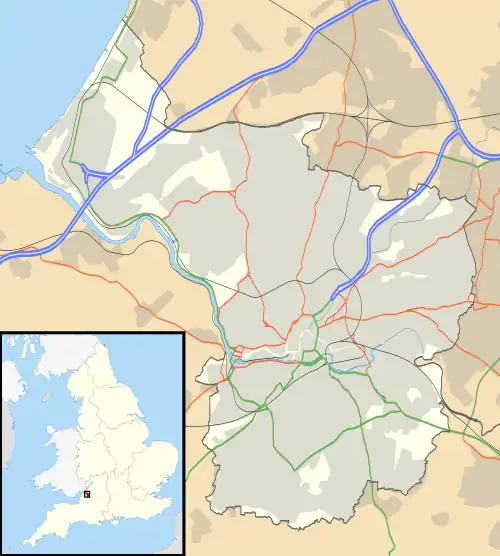| New Gaol, Bristol | |
|---|---|
 | |
 Location within Bristol | |
| General information | |
| Town or city | Bristol |
| Country | England |
| Coordinates | 51°26′46″N 2°35′53″W / 51.4462°N 2.5980°W |
| Completed | 1832 |
| Design and construction | |
| Architect(s) | Richard Shackleton Pope |
The New Gaol (also sometimes known as The Old City Gaol) is in Cumberland Road, Spike Island, Bristol, England, near Bristol Harbour.
History
The original New Gaol was designed by Henry Hake Seward and opened in 1820. In 1831, it was destroyed during the Bristol Riots and was rebuilt to designs by Richard Shackleton Pope, but was never properly completed until 1872. The gaol was closed in 1883 due to poor conditions and was largely demolished in 1898. In 1884, Horfield Prison was built to replace it.[1][2]
In 1821, three days after his eighteenth birthday, John Horwood was the first person to be hanged at the Gaol for murdering Eliza Balsum by hurling a pebble at her which hit her on the right temple and she then tumbled into a brook.
English Heritage designated The Gaol entrance wall and gateway and the south-east perimeter wall as a Grade II listed building. It is now the centre-piece of a redevelopment project in this area of the city.[3][4][5][2]
Archives
Papers related to the New Gaol (Ref. 17128) (online catalogue), and plans including Ref. 17567/5 (online catalogue) and 4312/76 (online catalogue) are held at Bristol Archives.
See also
References
- ↑ Historic England. "OLD CITY GAOL, ENTRANCE WALL AND GATEWAY (1207885)". National Heritage List for England. Retrieved 10 August 2016.
- 1 2 "The New Gaol". Bristol Law Society. Retrieved 10 August 2016.
- ↑ Historic England. "Old City Gaol, south-east perimeter wall (1202190)". National Heritage List for England. Retrieved 11 April 2007.
- ↑ Historic England. "Old City Gaol, entrance wall and gateway (1207885)". National Heritage List for England. Retrieved 11 April 2007.
- ↑ "Gruesome Bristol: New Gaol prison (BBC website with links to more items)". Retrieved 11 April 2007.